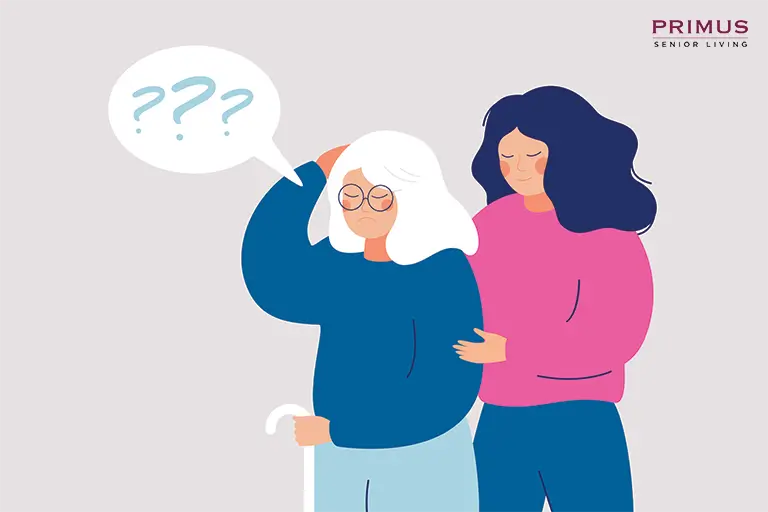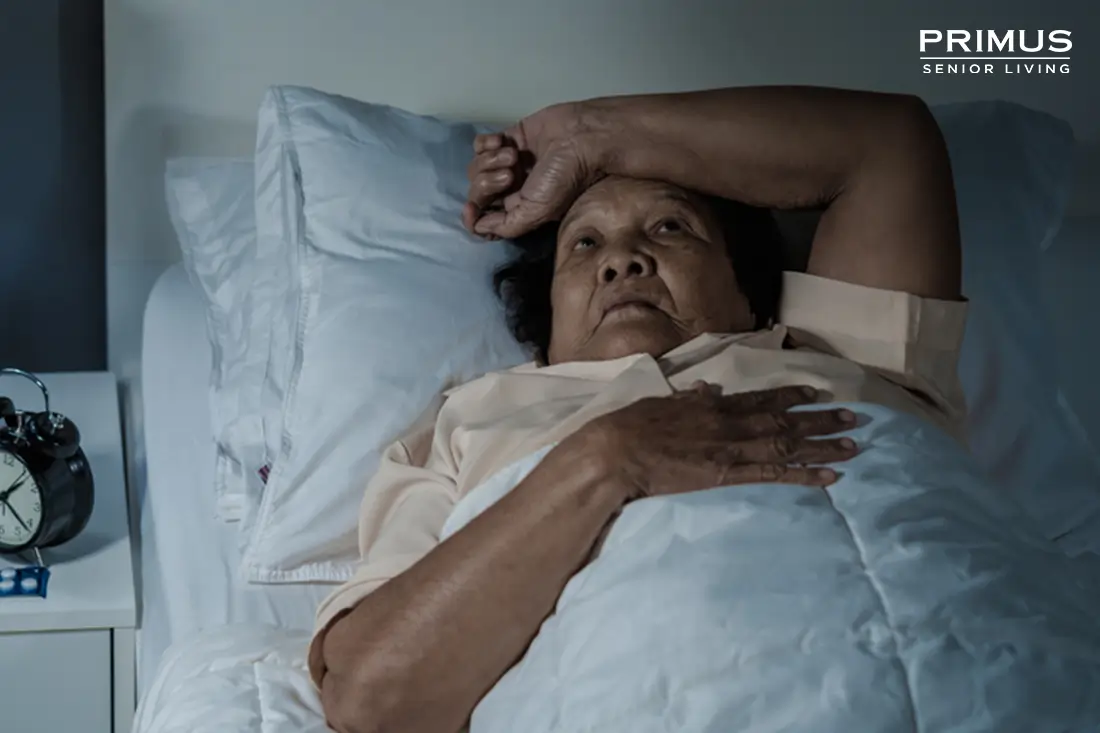Sleep is a basic necessity for our bodies and minds to rest and recharge. However, it becomes a bit more elusive as we age. While some may believe older adults need less sleep, the truth is quite the opposite. Seniors often face challenges getting a good night's rest, leading to what's known as elderly sleep problems. These disrupted elderly sleep patterns can significantly impact their overall well-being. Primus Senior Living will take you through the world of sleep in older adults, help you understand why they might be struggling to sleep, and look at ways to promote restful nights for our cherished seniors.
How Does Sleep Pattern Change in Older Adults?
One of the most common issues seniors face is waking up more often throughout the night. Imagine a nice long stretch of sleep being broken up three or four times! This fragmentation of sleep stems from several reasons:
-
Less Deep Sleep: As we age, our bodies naturally produce less melatonin, a hormone that helps regulate sleep. A decrease in this hormone means less time spent in deep sleep, which is the most restorative stage where our bodies truly get a chance to repair and rejuvenate, so disrupted deep sleep means more elderly sleep issues.
-
More Bathroom Usage: A condition called nocturia, the frequent need to urinate at night, disrupts sleep continuity in older adults; this is one of the top reasons for sleep changes in older adults.
-
Discomfort & Aches: Chronic health conditions like arthritis, unfortunately common in seniors, can cause pain and discomfort, making it difficult to fall asleep and stay asleep comfortably. Additionally, anxiety can also disrupt elderly sleep patterns.
These frequent habits of waking up have a ripple effect on seniors' daytime experiences. We can notice different elderly sleep problems, like
-
Disorientation & Confusion: Fragmented sleep can make it harder to concentrate and remember things, leading to feelings of confusion and forgetfulness.
-
Mental Changes: Long-term sleep disturbances can contribute to the development of cognitive decline or even dementia.
-
Depression: Chronic sleep deprivation can worsen symptoms of depression or even trigger its onset in some cases.
What Are The Common Sleep Disruptors In Elders?
Several underlying conditions can make it even harder for seniors to get a good night's rest. Here are some of the most common reasons leading to less sleep in older adults:
-
Insomnia: This sleep disorder makes falling asleep, staying asleep, or both a nightly struggle. Stress, anxiety, and certain medications are some of the many factors that can contribute to insomnia.
-
Restless Leg Syndrome (RLS): This neurological disorder causes an irresistible urge to move your legs, particularly at night. This constant feeling of needing to move makes it difficult to fall asleep and stay asleep and this has become a huge factor in elderly sleep issues.
-
Narcolepsy and Hypersomnia: These sleep disorders cause excessive daytime sleepiness and can disrupt nighttime elderly sleep patterns.
-
Sleep Apnea: This condition causes pauses in breathing during sleep, which can lead to fragmented sleep and daytime fatigue.
-
Shifted Sleep Schedule: Changes in routine, such as going to bed later or waking up earlier than usual, can disrupt the body's natural sleep-wake cycle.
What Are The Strategies For Better Sleep In Senior Individuals?
The good news is that there are steps we can take to help seniors achieve better sleep. Here are some key strategies to prevent sleep disruptions and promote restful slumber:
-
Creating a Relaxing Bedtime Routine: Establishing a consistent sleep schedule by going to bed and waking up at the same time each day, even on weekends. This helps regulate the body's natural sleep-wake cycle, which Primus Senior Living follows religiously. Wind down before bed with calming activities like reading a book, taking a warm bath, or listening to soothing music.
-
Napping Wisely: While napping can be tempting, especially after a long day, long afternoon naps can make it harder to fall asleep at night. Limit naps to 20-30 minutes in the early afternoon if needed.
-
Minimise Stimulants: Caffeine has a stimulating effect that can linger for hours, so avoid caffeinated beverages like coffee, soda, and energy drinks in the afternoon and evening. While alcohol may make you feel drowsy initially, it disrupts sleep later in the night.
-
Embrace Exercise: Engaging in regular physical activity can improve sleep quality. However, avoid strenuous exercise close to bedtime, as it can be stimulating. This is another factor that’s taken care of Primus Senior Living.
-
Healthy Diet Choices: Avoid heavy meals and sugary snacks close to bedtime, as they can disrupt sleep. A light, healthy bedtime snack can promote sleep, but avoid sugary foods that can cause energy spikes and crashes.
-
Managing Medical Conditions: If there is a suspect of an underlying medical condition like sleep apnea or RLS contributing to elderly sleep problems, it’s best to consult with a doctor. Early diagnosis and treatment can significantly improve sleep quality.
-
Limit Tobacco Use: Smoking can worsen sleep apnea and other sleep disorders. Quitting smoking or reducing tobacco use can lead to better sleep.
Additional Tips for Supporting Seniors with Sleep Issues
Beyond the strategies mentioned above, here are some additional tips for supporting seniors with sleep issues:
-
Create A Safe Sleep Environment: Ensure there are no tripping hazards or clutter in the bedroom, and consider nightlights for those who might need them.
-
Sunlight Exposure: Encourage getting some natural sunlight exposure during the day. This helps regulate the body's natural sleep-wake cycle.
-
Relaxation Techniques: Practices like deep breathing exercises, meditation, or gentle yoga before bed can promote relaxation and prepare the mind and body for sleep.
-
Social Connection: Loneliness and isolation can worsen sleep problems. Encourage social interaction with friends and family or participation in senior activities.
-
Manage Stress: Chronic stress can significantly disrupt sleep. Help seniors find healthy ways to manage stress, such as spending time in nature, listening to calming music, or spending time with loved ones.
Remember, getting good sleep is crucial for overall health and well-being at any age. By implementing these strategies and living in a supportive environment like Primus Senior Living, we can help our dear seniors live better!
You may also like

How To Detect Early Stages Of Dementia And Its Treatments
Dementia is a condition that is usually chronic or progressive in nature that deteriorates cognitive function beyond what might be expected from normal ageing. It affects memory, thinking, orientation, comprehension, calculation, learning capacity, language and judgement. However, dementia does not affect the consciousness of a person. Deterioration in emotional control, social behaviour or motivation accompanies and occasionally precedes impairment in cognitive function. Dementia can be the result of a variety of diseases and injuries that primarily or secondarily affect the brain, like Alzheimer's disease or stroke.
READ MORE
Why Luxurious Independent Senior Living Needs A Culture Of Leisure?
Imagine a world without any leisure or recreational activities. Can't really imagine one, right? That's because everyone needs a little fun and game amidst everything else going on in life, irrespective of age and gender. Taking time off and doing something you love or enjoy will actually make a difference in your mental and physical health. People tend to stay happier and it shows on their health as well. The same goes for seniors. Apart from the services and facilities provided at luxurious independent senior living communities, they also need to have a culture of leisure for the elderly. Here's why.
READ MORE

Leave a Comment